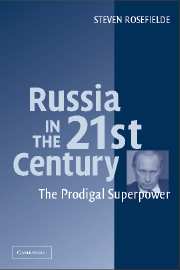Book contents
- Frontmatter
- Contents
- List of Figures and Tables
- List of Acronyms
- Preface
- Acknowledgments
- RUSSIA IN THE 21ST CENTURY
- Introduction
- 1 After “The End of History”
- 2 Prodigal Superpower
- 3 Structural Militarization
- 4 What Could Have Been Done?
- 5 Muscovite Metamorphosis
- 6 Military-Industrial Reform
- 7 National Vulnerabilities
- 8 The Miasma of Global Engagement
- 9 Putin's Choice
- 10 Candor
- Conclusion
- Glossary
- Notes
- Selected Bibliography
- Index
1 - After “The End of History”
Published online by Cambridge University Press: 18 December 2009
- Frontmatter
- Contents
- List of Figures and Tables
- List of Acronyms
- Preface
- Acknowledgments
- RUSSIA IN THE 21ST CENTURY
- Introduction
- 1 After “The End of History”
- 2 Prodigal Superpower
- 3 Structural Militarization
- 4 What Could Have Been Done?
- 5 Muscovite Metamorphosis
- 6 Military-Industrial Reform
- 7 National Vulnerabilities
- 8 The Miasma of Global Engagement
- 9 Putin's Choice
- 10 Candor
- Conclusion
- Glossary
- Notes
- Selected Bibliography
- Index
Summary
FROM COEXISTENCE TO THE END OF HISTORY
The prevailing perception of Soviet economic and military potential and hence post-Soviet possibilities was forged during the late 1950s and early 1960s by scholars connected with Harvard and MIT such as Abram Bergson, Alexander Gerschenkron, Simon Kuznets, Evsei Domar, Joseph Berliner, Franklyn Holzman, and Marshall Goldman. In an intellectually polarized era during which the Soviet Union was heralded as a socialist savior and damned by John Maynard Keynes as a “slave state,” these scholars appropriated the middle ground by offering sophisticated “theory-normed” positivist theories and impressive scholarship. Socialists were mollified by calculations showing extraordinary feats of growth during the 1930s using one convention, while Stalin's detractors were placated by humdrum results arrived at using another. The fears of those impressed by the Soviet Union's economic and military challenge during the 1950s were validated, but comfort was offered by predictions of the waning of the communist economic and military miracles and by proclamations of the superiority of markets over central planning in the long term. Although this supposed superiority was unwelcome news for socialists, they could find solace in the Soviet Union's purported egalitarian virtues; its rejection of militarism; its steadily improving living standard; and the possibility of democratic, market socialist reform, peaceful coexistence, and global systemic convergence. Patience was the watchword. If you didn't like what you saw today, tune back tomorrow for a brighter day, whatever that might be.
- Type
- Chapter
- Information
- Russia in the 21st CenturyThe Prodigal Superpower, pp. 11 - 20Publisher: Cambridge University PressPrint publication year: 2004



